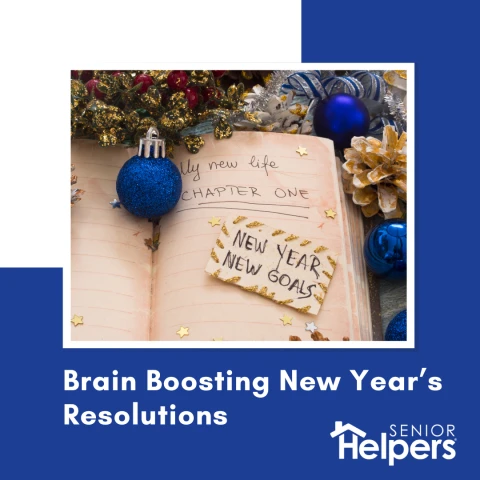
Brain Boosting New Year’s Resolutions
For older adults who are considering what their priorities should be for their New Year’s resolutions, they should keep in mind how crucial brain health is. While it is of course an easy feat to say that we are going to work harder to keep our brains healthy, to actually do it, one must know what the goals you will need to set are. Fortunately, much research has been done into the subject, and it has been found there are several pillars for maintaining good brain health.
The first pillar, and resolution, is to get in touch with your purpose and positivity. What is it that gives your life meaning? Knowing the answer to that may be more of a deciding factor to your health than you realize. Research has found that people with a greater sense of purpose have better cognitive function, and a lower risk of developing dementia later in life. Take some time to reflect on your place in life and what gives you a sense of worth and meaning.
The next resolution is to prioritize your sleeping habits. Sleep is when our brain rests and sorts through the day, and our body refreshes and revitalizes itself. When it comes to having a healthy brain, sleep is crucial. So much so, in fact, that researchers have found that not getting enough sleep in our midlife can actually be a risk factor for increasing the risk of developing dementia. There are multiple ways one can improve their sleep quality, such as sticking to a sleeping schedule of going to bed and getting up at the same time every day, keeping a cool temperature in the bedroom, and avoiding liquids and screens before bed.
Another important resolution is to stay socially connected. There is currently an epidemic of loneliness among older adults, and research has found that social isolation can increase the risk of premature death by almost 30%, almost as much as smoking up to 15 cigarettes daily! The factors that mitigate the negative impacts of loneliness are engaging in more activities, expanding your social network, and increasing the use of technology to allow for virtual social connection.
There has been a lot of research which has pointed to the fact that adult education can promote brain health, and can even reduce the risk of cognitive impairment. Recent research has found that older adults who regularly engage in activities that are cognitively stimulating, like writing, playing cards, or doing crossword puzzles, have a decreased risk of dementia. Older adults should choose activities that are both meaningful and fun, because without any real interest, sticking to the activity is not sustainable.
Exercise is a common resolution for people, and while the benefits of exercise for weight management and cardiovascular health are well-known, you may be surprised to learn that exercise is great for your brain, too. Regular exercise in midlife can reduce the risk of developing dementia by more than 30%. The hippocampus, the part of the brain that handles memory and learning, can actually increase in size from exercise, whereas without exercise, it can decrease each year.
As we begin this new year, let’s take these resolutions to heart and make brain health a priority! Whether it’s finding your purpose, improving sleep, staying connected, or incorporating physical and mental exercise, every small step can make a big difference in your overall well-being. At Senior Helpers of Gilbert & Chandler, we’re here to support you and your loved ones on this journey to healthier, more fulfilling lives. Reach out today to learn how our personalized care services can assist with maintaining cognitive health.